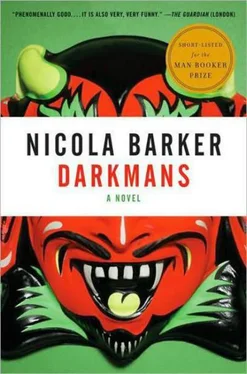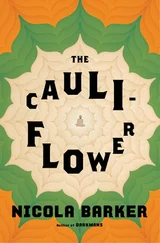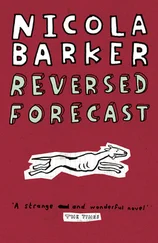‘Win?’
‘But I think it pays off — in fact it’s actually very interesting, really illuminating …’
‘Win?’
‘The way I see it — and I’ll try and keep this brief — is that John Scogin — simply as a character —seems to personify the coming together of all these totally disparate extremes — the same way Board himself does — I mean he’s this well-educated guy who advances his path in life by pretending to be a fool — a jester — and thoughout the narrative we see this bizarre opposition between fire and water which — the way I choose to interpret them, anyway — kind of represent passion and reason —sex and loyalty— lust and faith …’
‘ Win …’
‘Just listen , Kane,’ she snapped, ‘and you might actually learn something…’
Kane rolled his eyes.
‘Early on — yeah? — when Board describes John setting fire to the barn , for example…’
‘Sorry?’
Kane froze.
‘The barn. He sets fire to the barn. For me it’s one of the stand-out anecdotes of the entire book. An awful story, by modern standards, but presented in the text as simple high jinks — just a joke…’ ‘He sets fire to a barn?’
‘Yeah. He sets fire to a barn which he’s filled — at his wife’s behest — with dozens of pesky beggars from the local area who are waiting patiently inside in the misguided belief that he’s going to distribute alms…’
Alms
Kane started, involuntarily–
Arms
— then glanced down at his wrist. He’d pushed up his sleeve and was plucking at his scar–
Ow.
He quickly desisted, wincing.
‘…but instead he actually locks them in there and he sets the barn on fire…’
‘What?’ Kane was horrified. ‘He burns them?’
‘Sure.’
‘Does he kill anyone?’
‘I’m not sure. Boorde doesn’t say. The act itself is the punch-line, and then afterwards he accuses the beggars of setting fire to the barn themselves, out of pure spite…’
‘But this isn’t a true story, surely?’
‘Oh yeah. Absolutely. Exaggerated a little, perhaps…’
‘But that’s…’
‘I know. Totally fucked. The point is that John has this powerful association — this affinity — with fire. And it’s a very female vibe, somehow, a very negative, very sexual vibe, which is later played out fully in his warring with Elizabeth Woodville and his bizarre — almost neurotic — attacks on her honour…’
‘Elizabeth who?’
‘The queen. Elizabeth Woodville. Edward IV’s wife.’
‘So he was jester to the king ? I mean in real life?’
‘Of course. Who else?’ Win tutted, impatiently. ‘Keep up , Kane. So that’s the fire side dealt with — although there’s more— much more — obviously: his threat to burn down his house in Cheapside as a ruse to get protection money from his neighbours, climbing into an oven and leaving his arse hanging out so he doesn’t have to stare Edward in the face — because he’d been banned from doing so by royal edict…this was shortly after his return from France…’
‘He went to France?’
‘Yeah. He was banished there. But he was incredibly ambitious. He worked for Louis — the French king — and this uptight bishop who he alienates by making jokes about his long nose. He’s such an idiot. So arrogant. You kind of have to admire it, really. I mean there are no lengths he won’t go to, no lines he won’t cross. He’s a force of nature, this Dionysian spirit. This total arsehole. Utterly vicious and amoral. The absolute personification of misrule…’
‘Did they ever meet?’ Kane wondered.
‘Who?’
‘Board and this jester, this…this John character?’
‘Uh…I’ve no idea. Scogin would’ve been much older, but he was apparently quite long-lived, so there’s just an outside chance, I suppose. And he would’ve been a legendary figure during his own lifetime. All the top jesters were. Jesters held this very special place in medieval culture because the Motley served as a kind of protective armour. They were pretty much the only people in society who were permitted to speak their minds freely. They had a kind of intellectual immunity. This meant that humour could often be a direct route to power, and these guys knew it, Scogin more than anybody.
‘He was definitely at his creative peak during Edward’s reign. There was this astonishing kind of — I don’t know— affinity between them. Edward was hugely charismatic. Sensual. Very physically powerful. Brave. But ultimately degenerate. His main flaw was his love of beauty — of women, of sex. He was a terrible philanderer, and his wife tolerated it — extremely well, under the circumstances — but John wouldn’t let it go. He was like a cat with an injured bird, he kept on throwing it in her face, mocking her, deriding her, humiliating her. He put the king into an impossible position. He forced his hand. It was such an amazing period in history, so diverse and corrupt and fascinating; the very end of an age…Ends are so much more interesting than beginnings, don’t you think?’
She didn’t wait for him to answer.
‘So much more telling —everything in stasis, everything in flux . I mean think about it this way: John survived the Black Death, he lived on his wits, he wormed and blagged his way into the top echelons of society where he would’ve rubbed shoulders with the likes of the legendary Jane Shore — the king’s famous whore — and the young Richard. He would’ve been a witness to the murder of those two boys in the tower. And as loyal as he was to Edward, I’m guessing he was a pragmatist at heart, that he may well’ve served Richard too — which would’ve taken a huge leap, emotionally, morally …Although huge leaps were apparently very much his forte …’
‘What?’
‘He loved to jump. To leap things. It was all part of his act…’
‘Oh.’
‘He may even have survived through to the reign of Henry. He was one of the last of a great breed…’
‘The last? How d’you mean?’
‘Because of the development of the printed word. Books. The growth of the English language is generally believed to have precipitated the end of the jesting profession.’
‘Why?’
‘People started reading . They started entertaining themselves. They became more sophisticated. And what Board actually did was to solidify that process — to actively encourage it — both as a writer and as a physic. He condensed all the best known elements of John Scogin’s life into a loose narrative. He created one of the first ever joke books. He pinned John down with words, skinned and filleted him, dissected him. He made him tabloid . He sold him. I mean we’re talking 150, 200 years before Richardson wrote Clarissa —the first, great English novel…’ she paused, speculatively. ‘But that’s hardly the point…’ ‘Isn’t it?’
‘No. Because what’s really interesting is the text itself — this all-pervasive yin/yang quality, this literary opposition — as Board describes it — between fire and water. The wet side, the liquid side,’ Win ran on, ‘which is equally important — is personified by John’s loyalty to the masculine , to the king — Edward IV. When he arrives at court he stands under this dripping pipe and pretends he hasn’t realised he’s getting wet. It’s rather stupid, if you ask me, but this prank — which seems to go on for many hours — causes a real stir in court. Eventually it comes to the king’s attention and the long and the short of it is that the king employs Scogin as his jester…’
Читать дальше
Конец ознакомительного отрывка
Купить книгу












